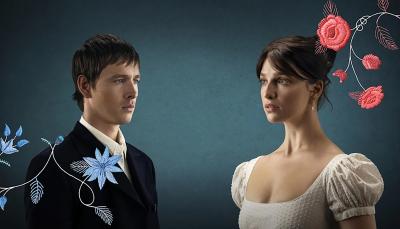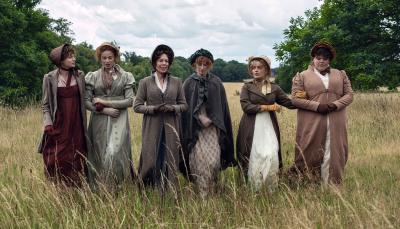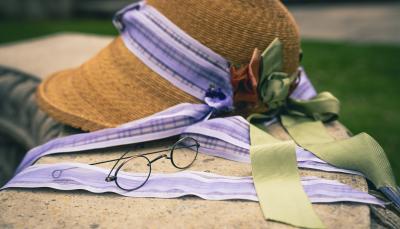Classics Revisited: 'Pride and Prejudice' 1980

For many Jane Austen enthusiasts, the 1980 BBC Pride and Prejudice was their introduction to televised adaptations of Austen’s work. Like any adaptation of a beloved and brilliant novel there are additions, changes, and inexplicably left out scenes. You can’t please all of the people all of the time, but this five-part series (currently available to stream on BritBox) has a good try.
The BBC has, over the decades, loved Pride and Prejudice, with the first version aired live as a one-hour show in 1938, two years before the wacko Olivier/Garson Hollywood treatment. No recording was made. As far as I can tell (because footage has been lost or destroyed and accounts vary), the novel was serialized in 1948, 1952, and 1958, and the first color series was made in 1967, the 150th anniversary of Austen’s death. The British Film Institute has footage from this 1967 version, and you can find snippets online. (A big shoutout to Mistress of Pemberley for her Pride and Prejudice excerpts where scenes from available productions are grouped together for comparison.) This five-episode version of Pride and Prejudice, which aired in the UK in 1979 and made its PBS debut in 1980, was directed by Cyril Coke, with a script by renowned feminist writer Fay Weldon, and remained the prototype for Austen adaptations for the next fifteen years, until Andrew Davies arrived to shake things up.
Let’s acknowledge the bad stuff first. This series is over forty years old and filmed mostly on video indoors, so the color is faded. The background sound has no ambiance, it's just one of those things that you notice only when it isn’t there. Other than technical issues, the acting is frequently one-note, with stage-trained actors barking their lines, the occasional dreadful wig (yes, you, Wickham), and unexciting costumes. It is a fact universally acknowledged that costume designers design for their contemporary audience as much as for historical accuracy, hence for instance, the crazy padded shoulders in the 1940 version. And what did we all love in Britain in the 1970s? Designer Laura Ashley and her retro, block-printed cotton dresses. And what did we not like? Bras, so the line of the dresses reflects exactly that modern aesthetic, not the authentic Regency profile.
However––hats off to designer Joan Ellicott––we have chemisettes, gloves, caps, and bonnets. There’s even a running joke about Lydia’s lace which does absolutely nothing to disguise her perpetual cleavage, but mostly the women are covered up to their chins during the daytime, all very proper. The gentlemen’s clothing is appropriately tight (because in the 1970s we liked that too).
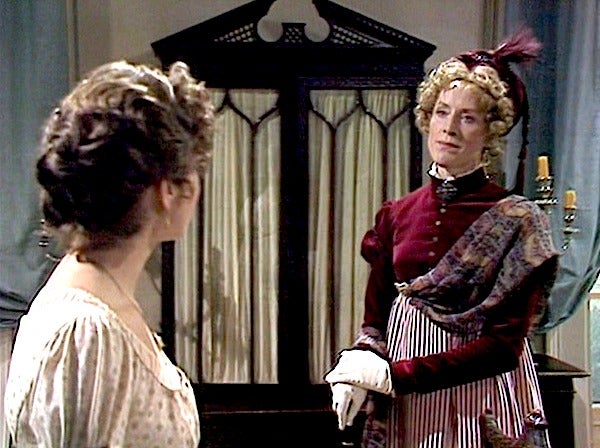
Over the years I have heard many Janeites praise this series for its fidelity to the book: Its language, and authentic period manners, and a lot of Austen’s own words are packed into each fifty-five-minute episode. It’s skillfully done for the most part, apart from when one character’s lines are assigned to another, but so much dialogue means the overall pacing is slow. I was very aware of this during the final episode where the Bennet family was still chewing over the recent exciting events of Lydia’s rescue and marriage while I was longing to get to the smackdown between Lizzie and Lady Catherine de Bourgh. It was almost worth the wait since Lady Catherine is played by Judy Parfitt, yes, Sister Monica Joan in Call the Midwife, whose hilariously funny performance crackles with energy. She’s a relatively young Lady Catherine (Parfitt was in her mid-40s then), an appropriate age to have a marriageable daughter.
Weldon also chose to emphasize some subtleties of the novel that have puzzled readers. Why does Anne de Bourgh smile at Lizzie as she and Mr. and Mrs. Collins prepare to leave Rosings after an uncomfortable evening of Lady C being Lady C? Anne is the silent and sickly daughter of Lady Catherine, destined to marry Darcy, although she pays him no attention whatsoever. Weldon has her silently clasp Lizzie’s hands in farewell, a stronger visual clue than a smile. Is it a cry for help, for rescue from her appalling mother? Has she, like the reader, or viewer, or Darcy himself, fallen in love with Lizzie’s wit and liveliness? Or does she foresee a time when she and Lizzie will be closer, having picked up on the attraction between her and Darcy?
Similarly, it’s made very clear that when Mr. Collins visits the Bennet family he is there to scope out the property he is to inherit, with the marriageable daughters taking second place on his to-do list. He quite blatantly inspects the house and its furnishings.
This interpretation is very much about the Bennet family as a whole, providing expanded roles to the other sisters. Mary, the bookworm middle sister given to senseless quotations and bad musical performances, is actually the first Bennet to find out about the arrival of Bingley and Darcy in the neighborhood. She is also quite interested in men and gets skittish around the handsome villainous Wickham. Points are taken off for her awful pudding-bowl haircut. The sisters mostly take pleasure in each other’s company, and it’s not always Jane and Lizzie vs. the silly sisters. However, the series gives the impression that their life is one of continual social events, whereas Austen makes it clear that assemblies, balls, visits, dinners and so on are important because there are so few of them.
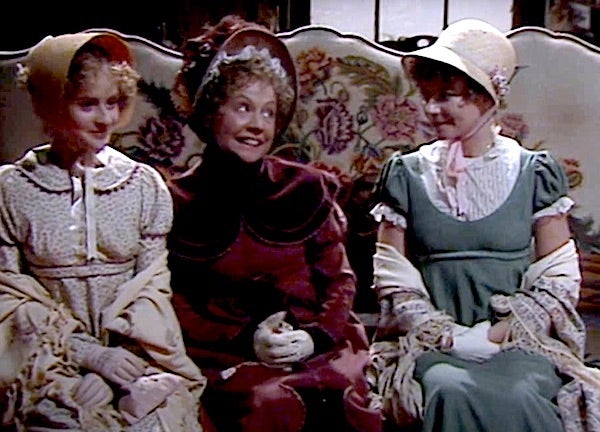
Kitty, who serves in the book as Lydia’s confidante and conspirator, is given a larger comic scope; if you want to make her burst into dramatic tears after the regiment leaves town, all you have to do is slip the word "Brighton" into a sentence. Similarly, Mrs. Bennet is not the nervous wreck of other versions, but a lively and determined woman, who bickers with Lizzie, constantly prying into her letters from Jane, even reading over her shoulder at one point. She’s no reader like her husband, but she has smarts and cunning. Clearly, her favorites are Lydia and Kitty, the pretty younger daughters, and she makes no secret of it, even suggesting at one point that Bingley might be interested in Kitty after he returns to the neighborhood.
There’s also a great additional scene featuring the Hursts and Miss Bingley meeting Elizabeth and her aunt and uncle at Darcy's house, Pemberley. While the Hursts and Miss Bingley conduct their usual inane conversation, the down-to-earth Gardiners exchange telling glances. You can imagine they’ll be recounting conversations back to each other, inventing catch phrases, and shrieking with laughter for years to come.
In every TV or film version of Pride and Prejudice, you’ll find a favorite scene or line omitted, and this series is no exception. Mr. Collins’s proposal to Charlotte is downplayed. Possibly it was felt that the pragmatic Charlotte Lucas, with her emphasis on having her own establishment and going open-eyed into a marriage with a buffoon, was incompatible with 1970’s feminism. Or, that it was too grim a prospect for this version, which veers toward the sunnier side of the novel.
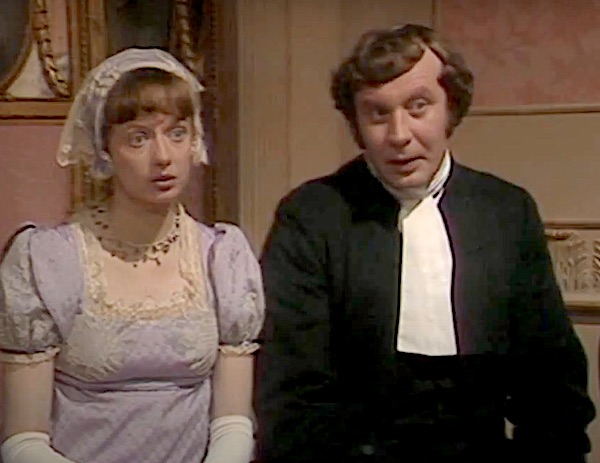
Deer in the headlights: Charlotte Collins (Irene Richards) and Mr. Collins (Malcolm Rennie) are subjected to the full force of Lady Catherine de Bourgh giving out unwanted advice and instructions to her minions. BBC.
Certainly, other issues are treated a bit too lightly––the discovery that Wickham left a mountain of debts behind him in the neighborhood (and I think this implies possible sexual misconduct too) is barely mentioned. Lizzie’s grief at Lydia’s elopement with Wickham is shown, but downplayed by the rest of the family, ignoring the point that after this scandal, the chances of any of the daughters making a good marriage are minimal. The cruel letter from Mr. Collins in which he advises the family should now consider Lydia dead is omitted. And Lizzie, so concerned about her sisters’ behavior, barely seems embarrassed that the owner of Pemberley is at home when she and the Gardiners are playing tourists. This is a massive humiliation for her, the equivalent of Mr. Collins sizing up her home, with the difference being that Mr. Collins is not capable of embarrassment.
With Priscilla Morgan’s strong and appropriately annoying portrayal of Mrs. Bennet, it’s a pity that Moray Watson’s Mr. Bennet, a proponent of the stand and bark school of acting, substitutes anger for Austen’s subtle yet merciless portrayal of sarcasm, self-pity, and passivity. Sadly, a crucial scene is omitted, because it just wouldn’t make sense in this version, where Mr. Bennet asks Lizzie if she is really sure that she wants to marry Darcy.

And now onto what I consider the really weak points of the production: The leads. (Takes cover to avoid flying rotten tomatoes from infuriated Janeites). It’s a pity that for a series with so much inventiveness and creativity, Darcy (David Rintoul) and Lizzie (Elizabeth Garvie) just don’t cut it. Garvie, making her debut more or less straight out of drama school, puts forth a valiant attempt at catching Lizzie’s mercurial spirit. She has a kindly twinkle in her eye when she fires out one-line zingers at Darcy, but it’s only when she confronts Lady Catherine de Bourgh that she shows some real steel. And while she may tease Darcy, but this Darcy does not tease her back, or seem interested at all.
Rintoul has gone on to have an active stage/screen career (with recent roles in both Game of Thrones and The Crown, as well as voiceovers for Peppa Pig), but generally this series was not a career– or star-making enterprise for him. For some, he is the perfect Darcy: He has great posture, a beautiful voice, and amazing cheekbones. That said, in most scenes he could have been wheeled in on casters and propped up among the furniture. Like Mr. Bennet, I too wondered what Lizzie saw in him. Possibly the most effective scene for the development of the relationship is the letter Darcy writes to her after his disastrous first proposal. In it he confesses his shame over Wickham’s behavior, revealing his innermost secrets. Lizzie reads the letter seated on a log while Darcy strides away over a rolling green landscape. It’s visually stunning. It’s moving and effective because it’s a voiceover, and Rintoul does the words justice.
You can see Lizzie is changing, evaluating her opinion of Darcy as they get to know each other a little more. But you get no sense that Darcy is also undergoing a profound emotional journey or even that he’s particularly interested in Lizzy, and there's certainly no hint of repressed passion. (If you want to find out more about Weldon's interest in Austen, I really recommend her collection of essays, Letters to Alice: On First Reading Jane Austen.)
The bottom line? Yes, this Pride and Prejudice is worth watching if you really like Jane Austen, and you may well enjoy it more than I did. Have you seen this version? What did you like about it? Or dislike? Have at it!


